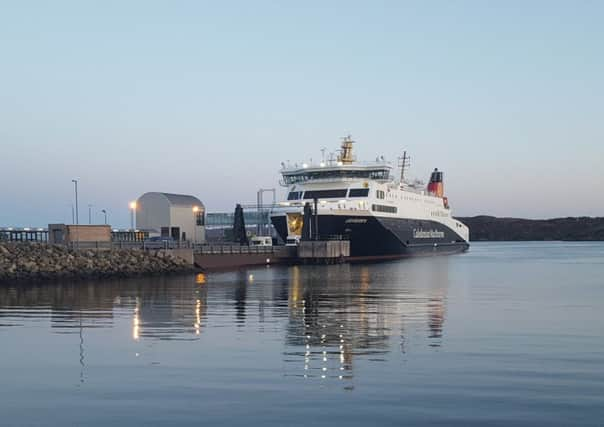Contract bans islanders from getting priority to ferry travel


This eye-brow raising piece of information was confirmed this week by the Islands’ ferry provider and Transport Scotland.
When asked about the possibility of ring-fencing space on board each sailing to be used only by people resident in the Islands, a Calmac spokesman told the Gazette: “There is no provision within the current Clyde and Hebrides Ferry Service contract to set aside a proportion of spaces for islanders.”
Advertisement
Hide AdAdvertisement
Hide AdTransport Scotland set out further details about the contract, as a spokesman explained: “Under the terms of the Clyde and Hebrides Ferry Service (CHFS) contract the Operator has to ensure that all bookings are dealt with on a first come, first served basis and that there is no discrimination between one ferry user and another.”
This news comes in the wake of calls for greater access to ferry travel from Stornoway and Tarbet to mainland Scotland.
Last year’s figures for ferry travel show that 94,693 vehicles were carried on the Stornoway to Ullapool ferry with 76,679 vehicles transported on the Harris to Uig, Skye route.
The Gazette recently reported on the harmful impact to Island businesses and the exclusion of islanders to opportunities because of the lack of travel options.
Advertisement
Hide AdAdvertisement
Hide AdThe concept of ‘first come, first served’, may seem like the fairest approach, but in practical use it is proving unfair to Islanders, as in the busy summer months places on board ferries are more likely to be booked up weeks in advance by visitors to the region, meaning that locals - who cannot plan long-term in this fashion - are squeezed out of their ‘lifeline’ travel routes.
It is a point that has been recognised by the Scottish Government.
Transport Scotland, said: “We are keen to address the concerns raised by some island communities regarding priority ferry travel, to reflect the fact that it is not always possible for local residents to be able to predict when they next need to use a peak time service that may be heavily booked up, well in advance, of the date of travel.
“We have already engaged with CalMac on how best to accommodate those with medical needs, for example, following engagement with community representatives.
Advertisement
Hide AdAdvertisement
Hide Ad“The Minister and his officials will be considering these challenges more fully with CalMac going forward.
“The new booking, reservation and ticketing system that is being secured by CalMac, and which is being fully funded by Scottish Ministers, may offer some possibilities in that regard and will enable CalMac to better engage with its customers in managing demands on the network.”